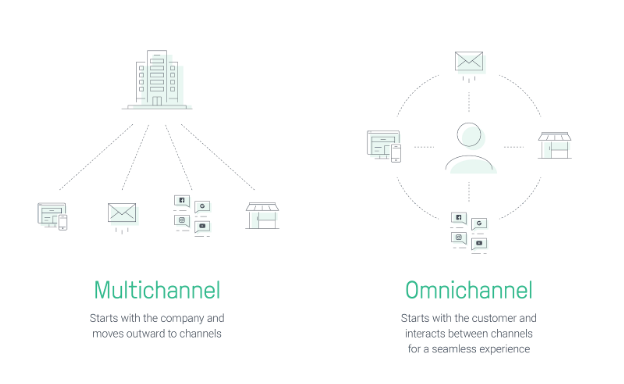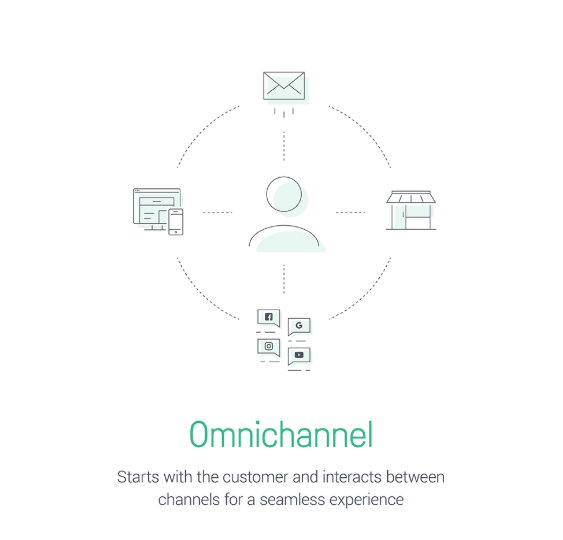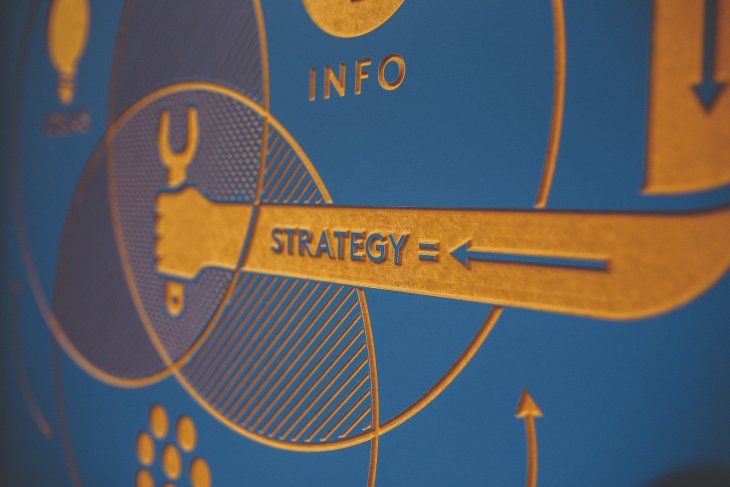“Omnichannel” is one of the hottest buzzwords in digital marketing, and it’s clear that the trend isn’t going away anytime soon. Omnichannel marketing gives you more control than ever over the customer experience and allows you to fine-tune every aspect of each campaign across multiple channels.
This article will cover everything you need to know in order to improve customer relationships within an omnichannel marketing approach. An effective omnichannel strategy can help you achieve better audience engagement and a higher lifetime customer value.
Multichannel vs. Omnichannel Marketing
Omnichannel marketing has a lot in common with multichannel strategies, and some people use the two terms to refer to the same types of campaigns. On the other hand, it’s important to understand the distinction between omnichannel and multichannel marketing.
The phrase “multichannel marketing” has been used for a long time to refer to any campaign that makes use of more than one channel. This isn’t exclusive to digital marketing—a campaign that includes both TV and print ads, for example, is considered a form of multichannel marketing.
While multichannel marketing is defined by its use of multiple platforms, omnichannel campaigns involve an entirely different approach to audience outreach. Rather than viewing each channel separately and creating content separately for every platform, omnichannel marketers use a variety of channels to create a more seamless customer experience.

How Does Omnichannel Work?
Omnichannel can refer to a variety of marketing strategies, so different people have unique understandings of how omnichannel campaigns should work. In general, omnichannel marketing involves collecting audience data and using that information to develop more personalized messaging for each customer.
Rather than starting each support interaction from the beginning, for example, you can give agents access to a user’s customer history profile along with transcripts of previous touchpoints. This significantly decreases turnaround times on support inquiries and improves customer satisfaction.
Some of the most common criteria businesses use for audience segmentation include email behavior, previous web visits, purchase history, location, age, and gender. Combining these data points gives you the opportunity to develop sophisticated audience segments and create an accurate customer persona.
Effective omnichannel marketing requires much more customer information than businesses typically gather, so most brands subscribe to an omnichannel marketing service in order to collect and store relevant data. Many of these applications also provide tools for building campaigns based on customer data and use it for their marketing and pricing strategies.

CRM and Omnichannel Marketing
Omnichannel marketing is all about streamlining the shopping experience for your customers. Audiences expect more relevant and personalized messaging than ever before, and these tools enable you to deliver high-quality and engaging content while improving performance on every digital marketing metric.
Positive customer service interactions are critical for long-term retention. Omnichannel marketing helps you craft campaigns that focus on providing a real value to the customer and earning their trust. Moving away from a more conventional approach that focuses only on immediate sales will actually have a positive impact on the lifetime value of each customer.
While a CRM handles most of your customer needs, omnichannel marketing can help boost what your CRM already does.
How Omnichannel Boosts an Already Powerful CRM
Your current CRM might manage your customer service well, but combining your CRM with an omnichannel marketing approach can make the way you communicate with your customers that much more powerful. These are some of the most important reasons to consider implementing omnichannel strategies—even if you’re already satisfied with your support practices.
Data Gathering
You don’t need much data for traditional approaches to support, but exceptional customer service requires a significant quantity of customer information. Omnichannel marketing can improve the way that your CRM gathers and stores customer data, by tracking how customer behavior changes by channel.
Omnichannel marketing tools facilitate data gathering and give your team customizable access to relevant customer information. Adding omnichannel to your marketing toolkit is the next step toward upgrading your support tactics and showing customers that you care about their experience.
Turnaround Times
CRMs are the most effective way to minimize turnaround times on support requests, and omnichannel marketing automation can reduce that turnaround even more. Even a slight increase in the efficiency of your customer service agents will have a substantial impact on your bottom line and cost per resolution.
Customer Journey Tracking
Your CRM is great at collecting customer data and updating that data with each interaction you have with your customer. However, it can definitely get that omnichannel boost when it comes to the customer journey. By adding in omnichannel, you can track how the customer interacts with your brand at each step of the customer journey.
Cross-Channel Support
Some businesses still offer customer service on a single channel, but it’s clear that audiences expect to engage with their favorite brands on the most convenient platforms. Limiting your support options to just one channel makes your agents less accessible and adds an unnecessary barrier to the customer experience.
If you’re reluctant to switch to multi-channel customer support, an omnichannel marketing application will give you all the tools you need to make a seamless transition. Your audience will appreciate the added flexibility, and you’ll resolve inquiries more quickly by directing customers to the best channel for their specific question.
Create a Better Customer Experience
Going right along with cross-channel support, creating a great customer experience is the entire point of having customer data accessible in the first place. A CRM centralizes that data so your customer success team can maintain the same conversation, regardless of which channel the customer reaches out on, nor the support agent responding.
Omnichannel boost this by also unifying the marketing message that the customer receives with their customer journey and their contact with your support team. This boosts and streamlines the overall customer experience.
Reporting
There’s always room for improvement when it comes to customer service, and the most proactive brands are constantly looking for new ways to differentiate themselves and offer a more fluid experience. Omnichannel marketing can improve the range of reporting options that CRMs provide, which will allow you to analyze your own results and look for new opportunities.
Omnichannel marketing solutions provide robust reporting features that give you real-time information about nearly every aspect of your support touchpoints. They’re also much more useful when comparing results across multiple channels. These reporting tools provide the data you need to make more informed decisions.
Customer Journey Tracking
Your CRM is great at collecting customer data and updating that data with each interaction you have with your customer. However, it can definitely get that omnichannel boost when it comes to the customer journey. By adding in omnichannel, you can track how the customer interacts with your brand at each step of the customer journey.
Cross-channel Support
Some businesses still offer customer service on a single channel, but it’s clear that audiences expect to engage with their favorite brands on the most convenient platforms. Limiting your support options to just one channel makes your agents less accessible and adds an unnecessary barrier to the customer experience.
If you’re reluctant to switch to multi-channel customer support, an omnichannel marketing application will give you all the tools you need to make a seamless transition. Your audience will appreciate the added flexibility, and you’ll resolve inquiries more quickly by directing customers to the best channel for their specific question.
Create a Better Customer Experience
Going right along with cross-channel support, creating a great customer experience is the entire point of having customer data accessible in the first place. A CRM centralizes that data so your customer success team can maintain the same conversation, regardless of which channel the customer reaches out on, nor the support agent responding.
Omnichannel boost this by also unifying the marketing message that the customer receives with their customer journey and their contact with your support team. This boosts and streamlines the overall customer experience.
Reporting
There’s always room for improvement when it comes to customer service, and the most proactive brands are constantly looking for new ways to differentiate themselves and offer a more fluid experience. Omnichannel marketing can improve the range of reporting options that CRMs provide, which will allow you to analyze your own results and look for new opportunities.
Omnichannel marketing solutions provide robust reporting features that give you real-time information about nearly every aspect of your support touchpoints. They’re also much more useful when comparing results across multiple channels. These reporting tools provide the data you need to make more informed decisions.
Conclusion
Moving to an omnichannel marketing approach can be intimidating, but you don’t need to make the transition all at once. Many brands change their strategies gradually to give their team time to adjust and give themselves time to evaluate each step of the process. Don’t be discouraged if your switch to omnichannel doesn’t happen overnight.
CRMs and omnichannel marketing tools are both extremely powerful if implemented effectively, but they’re even more powerful when used together. While your CRM may offer some great results, it still has an important role to play in your approach to customer service and should be used alongside omnichannel marketing.


